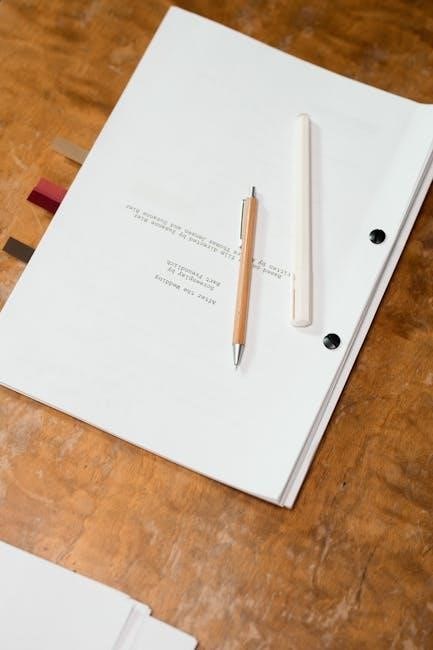Overview of “Everyone’s an Author 3rd Edition”
“Everyone’s an Author 3rd Edition” is a widely used textbook focusing on writing and communication skills, offering practical guidance for diverse audiences. Its collaborative authorship and comprehensive approach make it a valuable resource in academic settings, with discussions on accessing the PDF reflecting its popularity among students and educators.
“Everyone’s an Author 3rd Edition” is a comprehensive guide designed to enhance writing and communication skills across various contexts. The textbook emphasizes practical applications, offering insights into diverse writing styles, multimodal composition, and collaborative projects. It provides clear examples and exercises to help learners develop their voice and adapt to different audiences. With a focus on real-world relevance, the book supports students in navigating academic, professional, and personal writing challenges effectively. Its structured approach makes it accessible to learners of all skill levels.
Key Features and Updates in the 3rd Edition
The 3rd Edition of “Everyone’s an Author” introduces updated chapters on multimodal composition, reflective writing practices, and digital literacy. New case studies and exercises address contemporary communication challenges. The book now includes expanded coverage of collaborative writing projects and revised guidelines for citing digital sources. Additionally, the edition features enhanced visuals and interactive elements to engage learners. These updates ensure the textbook remains relevant, equipping students with practical skills for today’s diverse communication environments while maintaining its accessible and student-centered approach.
Authors and Contributors
Andrea Lunsford leads as the primary author, joined by Michal Brody, Lisa Ede, and Keith Walters, ensuring diverse expertise and collaborative input in the book’s development and content.
Andrea Lunsford and Her Role in the Book
Andrea Lunsford is the lead author of “Everyone’s an Author 3rd Edition,” bringing her expertise in rhetoric, writing studies, and multimodal communication. Her work emphasizes collaborative writing processes and real-world applications, making the textbook accessible and engaging for diverse learners. Lunsford’s contributions focus on empowering students to navigate various communication formats, from academic essays to digital media, ensuring the book remains a vital resource in academic settings. Her approach balances theoretical insights with practical guidance, fostering critical thinking and effective expression.
Michal Brody, Lisa Ede, and Keith Walters: Their Contributions
Michal Brody, Lisa Ede, and Keith Walters bring diverse expertise to “Everyone’s an Author 3rd Edition.” Brody contributes insights into multimodal communication, while Ede focuses on collaborative writing and rhetorical theory. Walters provides perspectives on language variation and academic discourse. Together, they enhance the textbook’s comprehensive approach, ensuring it addresses contemporary communication challenges and supports students in developing versatile writing skills. Their collaborative efforts make the book a rich, inclusive resource for modern learners.
Other Collaborators and Their Expertise
Beverly Moss and Carole Clark Papper are among the additional contributors, bringing specialized knowledge in rhetoric and composition studies. Moss focuses on African American literacies, while Papper contributes to understanding multimodal communication. Their expertise, alongside other collaborators, enriches the textbook by addressing diverse writing contexts and fostering inclusive learning. These contributors ensure the book remains relevant and accessible, catering to a wide range of student needs and academic environments.
How to Access “Everyone’s an Author 3rd Edition PDF”
The PDF can be accessed by purchasing from Amazon, accessing through academic platforms, or exploring free shares on Reddit communities like r/FindMyTextBookForMe.
Official Sources: Amazon and Bookstores
The “Everyone’s an Author 3rd Edition PDF” can be legally purchased from Amazon and other authorized bookstores. Amazon offers the eBook and paperback versions, with the ISBN-13: 978-0393420838 for the eBook and 978-0393420814 for the paperback. These official sources ensure high-quality content and legal compliance. The textbook, authored by Andrea Lunsford, Michal Brody, Lisa Ede, and Keith Walters, is widely available through these channels, making it accessible to students and educators worldwide.
Purchasing from official sources guarantees authenticity and supports the authors and publishers. It’s the recommended method for those seeking a reliable and legal copy of the textbook.
Free Resources: Reddit and Online Communities
Reddit and other online communities often serve as platforms for sharing and requesting free resources like “Everyone’s an Author 3rd Edition PDF.” Subreddits such as r/FindMyTextBookForMe and r/textbookrequest frequently feature posts from users seeking or offering access to the textbook. While these communities can be helpful, they operate in a legal gray area, and users should be cautious about copyright infringement. Always consider the ethical implications and legal risks before accessing or sharing copyrighted materials through such channels.
Such platforms highlight the demand for affordable educational resources but also raise concerns about unauthorized distribution and its consequences.
Academic Platforms and Libraries
Academic platforms and libraries often provide access to “Everyone’s an Author 3rd Edition PDF” through institutional subscriptions or e-resource databases. Many universities offer digital versions of textbooks like this one via platforms such as JSTOR, ProQuest, or their library’s online catalog. This method ensures legal and ethical access, supporting both authors and publishers. Students and researchers can log in through their institution’s portal to view or download the PDF, making it a reliable and legitimate source for academic use.
ISBN and Edition Details
The ISBN-13 for “Everyone’s an Author 3rd Edition” is 978-0393420838 and 978-0393420814, distinguishing it from other editions. Multiple editions exist, each with unique content and formats.
ISBN-13: 978-0393420838 and 978-0393420814
The ISBN-13 numbers 978-0393420838 and 978-0393420814 identify “Everyone’s an Author 3rd Edition” in digital and print formats. These codes are essential for accurate identification and purchasing. The PDF version, widely sought after for its accessibility, corresponds to these ISBNs, ensuring authenticity. Reddit discussions and online marketplaces like Amazon reference these codes, highlighting their importance for verifying the book’s legitimacy. They also help differentiate this edition from others, maintaining clarity for students and educators seeking the correct resource.
Different Editions and Their Variations
“Everyone’s an Author 3rd Edition” is available in multiple formats, including paperback and digital versions; The PDF edition is particularly popular for its accessibility. Earlier editions differ in content and structure, with updates in the 3rd Edition focusing on modern writing practices. Variations include a version with readings, enhancing its educational value. Online discussions highlight the demand for specific editions, reflecting diverse user preferences. The availability of different formats ensures the book meets various learning needs, making it a versatile resource for students and educators alike.

Reddit Discussions and Availability
Reddit hosts active discussions about “Everyone’s an Author 3rd Edition PDF,” with communities like r/FindMyTextBookForMe and r/textbook offering requests and availability updates frequently.
r/FindMyTextBookForMe and Other Subreddits
Subreddits like r/FindMyTextBookForMe and r/textbookrequest are popular platforms for requesting or sharing “Everyone’s an Author 3rd Edition PDF.” Users often post requests for specific pages or the full PDF, while others offer links or files. These communities are active, with frequent updates and discussions about accessing academic materials. However, sharing copyrighted content raises legal concerns, and users are encouraged to verify sources and consider official purchases to comply with copyright laws and ethical guidelines.
Requests for Specific Pages or Full PDFs
Reddit users often request specific pages or the full “Everyone’s an Author 3rd Edition PDF” for academic purposes. Some users ask for individual chapters or pages due to incomplete downloads, while others seek the entire book. These requests are common in subreddits like r/textbookrequest and r/FindMyTextBookForMe. Community members sometimes respond with direct links or offers to share the content, though such exchanges may violate copyright laws. Legal alternatives, such as purchasing from official sources, are often encouraged to ensure compliance with ethical standards.
Community Guidelines and Legal Considerations
Reddit communities like r/FindMyTextBookForMe and r/textbookrequest enforce strict guidelines against piracy. Sharing or requesting copyrighted materials, such as the “Everyone’s an Author 3rd Edition PDF,” may violate Reddit’s policies and copyright laws. Users are reminded that unauthorized distribution of textbooks can lead to legal consequences, including fines and penalties. Ethical considerations emphasize respecting authors’ rights and supporting legal purchases to ensure fair compensation for their work.

Metadata and Author Identification
Much like the Adobe Support Community discussion, editing metadata in a PDF can alter the visible author information, but technical tools may still trace the original creator.
Can People Find the Original Author of a PDF?
While PDF metadata can be edited to change the visible author, tools like Adobe Acrobat or online services can analyze the file to uncover the original creator. Browser history and embedded document properties may also reveal the source, aiding in tracing the true author despite metadata alterations.
Editing Metadata: Tools and Techniques
Metadata editing tools like Adobe Acrobat, ExifTool, or free online editors allow users to modify author information in PDFs. Techniques include manually altering fields, using batch processors, or applying scripts. While these methods effectively change visible data, they may not erase the original creator’s trace completely, as embedded properties can sometimes be recovered through forensic analysis.
Limitations of Metadata Editing
Despite tools like ExifTool or Adobe Acrobat enabling metadata changes, certain original details, such as embedded watermarks or creation dates, may remain traceable. Additionally, some platforms retain uploaders’ information, potentially exposing the true author. While metadata editing can obscure authorship, it doesn’t guarantee anonymity, as forensic analysis or embedded properties might still reveal origins.
Legal and Ethical Considerations
Sharing copyrighted materials like “Everyone’s an Author 3rd Edition PDF” without authorization violates copyright laws and raises ethical concerns about compensating creators for their work.
Copyright Laws and Textbook Distribution
Distributing “Everyone’s an Author 3rd Edition PDF” without authorization violates copyright laws, as the content is protected under intellectual property rights. Sharing or downloading the PDF without purchasing it from official sources is illegal and undermines the efforts of authors and publishers. While free resources may exist online, accessing them without proper licensing is a breach of copyright. Always purchase from reputable sources like Amazon or use academic platforms legally to support creators and comply with the law;
Ethical Implications of Sharing PDFs
Sharing “Everyone’s an Author 3rd Edition PDF” without permission raises ethical concerns, as it deprives authors and publishers of fair compensation for their work. While access to knowledge is important, distributing copyrighted material without consent undermines the efforts of creators and violates intellectual property rights. It also discourages investment in educational resources, potentially harming the quality of future publications. Ethical considerations encourage supporting authors by purchasing legitimate copies, ensuring the sustainability of academic content creation.
Consequences of Unauthorized Distribution
Unauthorized distribution of “Everyone’s an Author 3rd Edition PDF” can lead to legal consequences, including fines and penalties for copyright infringement. Sharing or downloading copyrighted material without permission violates intellectual property laws, potentially resulting in legal action. Academic institutions may also impose disciplinary measures for such violations. Additionally, unauthorized distribution undermines the financial support authors and publishers receive, which is crucial for creating and updating educational resources. It is essential to respect copyright laws to avoid these repercussions and support the ethical production of academic content.

Academic and Practical Uses
“Everyone’s an Author 3rd Edition” is widely used in academic settings for teaching writing, communication, and critical thinking. Its structured approach to composition and rhetoric makes it a valuable resource for educators and students, promoting effective expression across diverse contexts.
Importance of the Book in Academic Settings
“Everyone’s an Author 3rd Edition” is a cornerstone in academic writing education, offering comprehensive guidance on composition, rhetoric, and communication. Its structured approach helps students develop critical thinking and expression skills, essential for academic success. The textbook is widely adopted in composition courses, providing practical exercises and real-world examples that cater to diverse learning needs. Its collaborative authorship ensures a well-rounded perspective, making it a valuable resource for fostering effective communication in educational environments.
Practical Applications of the Content
The textbook emphasizes real-world writing scenarios, equipping students with skills for professional and personal communication. Chapters on digital writing, visual rhetoric, and collaboration prepare learners for modern workplaces. Practical exercises encourage applying theoretical concepts to everyday situations, such as crafting resumes, composing emails, or creating presentations. The content’s focus on adaptability ensures students can navigate diverse communication platforms effectively, making it a versatile tool for both academic and professional environments.
Student Feedback and Reviews
Students generally praise “Everyone’s an Author 3rd Edition” for its clarity and relevance to modern writing challenges. Many appreciate the practical exercises that enhance real-world application. Some highlight the book’s effectiveness in improving communication skills, while others note its comprehensive coverage of digital writing. However, a few students find certain sections dense and prefer more visual aids. Overall, the book is well-regarded for its ability to engage learners and prepare them for diverse writing scenarios, making it a valuable academic resource.

Technical Aspects of the PDF
The PDF’s file structure includes embedded metadata, which can reveal creation tools and author details. Editing tools like Adobe Acrobat allow metadata modification, while browser history may trace its source, balancing privacy and accessibility.
File Structure and Properties
The PDF’s file structure includes embedded fonts, images, and text, ensuring compatibility across devices. Properties like author, creator, and creation date are stored in metadata. While tools like Adobe Acrobat allow editing metadata, certain elements, such as embedded watermarks or encryption, may remain intact, preserving document integrity and traceability, despite metadata alterations, ensuring some level of authenticity remains detectable.
Browser History and File Source Tracking
Browser history can reveal where a PDF was downloaded from, as URLs and access times are recorded. However, if the PDF was shared or downloaded from a direct link, tracing its origin becomes challenging. Advanced users might analyze network logs or referrer data, but such methods are complex. Metadata editing can obscure the file’s source, making it difficult to determine its initial distribution point without additional investigative tools or access to server logs.
Tools for Analyzing PDF Metadata
Tools like Adobe Acrobat Pro, ExifTool, and online metadata viewers can analyze PDFs to extract author, creation date, and modification details. These tools help identify the original creator and track changes, even if metadata was altered. Advanced users can use command-line tools to dig deeper into file properties, aiding in verifying authenticity or tracing sources. However, edited or stripped metadata may limit the effectiveness of these tools in identifying the original author or file history.
Accessing “Everyone’s an Author 3rd Edition PDF” responsibly is crucial. Prioritize legal sources and respect copyright laws to ensure ethical academic practices and support authors’ work.
Final Thoughts on Accessing and Using the PDF
Accessing “Everyone’s an Author 3rd Edition PDF” requires careful consideration of legal and ethical implications. While the internet offers various sources, prioritize official channels like Amazon or academic libraries to ensure legality and support authors. Sharing or downloading PDFs without authorization violates copyright laws and undermines the creators’ efforts. Encourage responsible use by purchasing the book or accessing it through legitimate platforms to uphold academic integrity and ethical standards in education.
Encouragement for Legal and Ethical Practices
Encourage legal and ethical practices by purchasing “Everyone’s an Author 3rd Edition” from official sources or accessing it through academic libraries. Support authors and publishers by respecting copyright laws, as unauthorized sharing undermines their work. Ethical behavior fosters a culture of integrity in education and ensures fair compensation for creators. Prioritize legal avenues to promote sustainability in academic publishing and uphold moral standards in scholarly communities.
